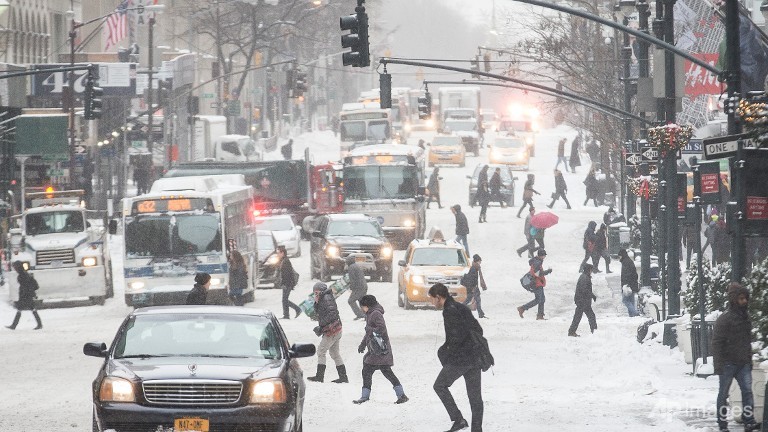Arctic air brings record cold to huge swath of US

Pedestrians brave wind and snow as they cross Fifth Avenue in New York. (AP Photo/John Minchillo)
CHICAGO: Dangerously cold arctic air swept across a huge swath of the United States on Monday, making travel treacherous, forcing schools to close and prompting officials to plead with residents to stay indoors.
A shift in a weather pattern known as the "polar vortex" triggered a drastic drop in temperatures to lows not seen in two decades, and coincided with wind chill warnings in much of the east of the country.
Comertown, Montana recorded the lowest wind chill value so far at -53 degrees Celsius while North Dakota, South Dakota and Minnesota were not much warmer.
For comparison, this was significantly colder than the South Pole, which recorded a wind chill reading of -34 degrees Celsius.
Even the typically temperate Deep South was feeling the chill with a hard freeze warning threatening crops and livestock.
On the East Coast, a brief lull in the deep freeze greeted commuters, but rainstorms threatened to turn roads and sidewalks into ice rinks overnight as temperatures were expected to plunge.
Deaths blamed on the frigid weather include a worker crushed by a 30-metre pile of salt being prepared to treat roads on Friday, and a 71-year-old woman suffering from Alzheimer's disease who froze to death after getting lost in New York state.
The body of a 90-year-old woman was found face down in the snow next to her car in Ohio Monday morning, the Toledo Blade reported.
At least a dozen other people were reportedly killed in crashes on icy roads, including four people whose sport utility vehicle slid off a rural Minnesota highway and fell into the Mississippi River.
Four Chicago men aged 48 to 63 died of apparent heart attacks while shovelling the snow over the weekend, the Chicago Tribune reported.
The cold snap came after two massive winter storms snarled travel, grounded thousands of flights and dumped as much as 60 centimetres of snow in the first few days of the year.
More than 4,300 US flights were cancelled on Monday -- nearly half of those in Chicago -- and more than 6,500 were delayed, according to FlightAware.
The city of Chicago was among scores of municipalities which told parents to keep their children at home rather than risk sending them out into winds so bitter that skin could freeze in a matter of minutes.
The governor of Minnesota cancelled school across the entire state on Monday.
Illinois Governor Pat Quinn declared a state of emergency and called up the National Guard to help rescue stranded motorists as high winds whipped up blinding snow.
"We are facing a dangerous combination of low temperatures, black ice and snow drifts," Quinn said, as he urged people to stay off the roads.
Quinn praised the "heroic" efforts of National Guard troops who cleared a 375 vehicle backup and a forestry officer who rescued seven stranded people and two of their pets using a snowmobile.
In Milwaukee, Wisconsin, officials warned residents to stay indoors and urged schools to shut down as temperatures dropped to -24 degrees Celsius, with the wind chill making it feel like -37 degrees Celsius.
"Police are reaching out to homeless citizens in order to help them find the nearest shelter," city spokeswoman Sarah DeRoo told AFP.
Indianapolis mayor Greg Ballard barred everyone except emergency workers from driving at the height of the storm Sunday and urged residents to stay indoors unless absolutely necessary on Monday.
"This extreme cold poses a serious health and safety risk," he warned.
But with thousands of people without power after electrical lines were felled, home was not always the best option.
Those who couldn't stay with family or friends were urged to seek out community centres which were opened as temporary shelters.
The extreme cold disrupted flights and classes in Canada as well. In the Atlantic island province of Newfoundland, more than 30,000 people were without power.
Nationwide, officials warned of "treacherous" travel conditions, but meteorologists said a warming trend would begin at mid-week.
What the stars mean:
★ Poor ★ ★ Promising ★★★ Good ★★★★ Very good ★★★★★ Exceptional
Latest News
More News
- Russian President congratulates Vietnamese Party leader during phone talks (January 25, 2026 | 09:58)
- Worldwide congratulations underscore confidence in Vietnam’s 14th Party Congress (January 23, 2026 | 09:02)
- Political parties, organisations, int’l friends send congratulations to 14th National Party Congress (January 22, 2026 | 09:33)
- 14th National Party Congress: Japanese media highlight Vietnam’s growth targets (January 21, 2026 | 09:46)
- 14th National Party Congress: Driving force for Vietnam to continue renewal, innovation, breakthroughs (January 21, 2026 | 09:42)
- Vietnam remains spiritual support for progressive forces: Colombian party leader (January 21, 2026 | 08:00)
- Int'l media provides large coverage of 14th National Party Congress's first working day (January 20, 2026 | 09:09)
- Vietnamese firms win top honours at ASEAN Digital Awards (January 16, 2026 | 16:45)
- ASEAN Digital Ministers' Meeting opens in Hanoi (January 15, 2026 | 15:33)
- ASEAN economies move up the global chip value chain (December 09, 2025 | 13:32)
















 Mobile Version
Mobile Version